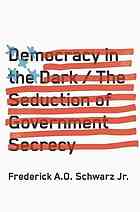
Democracy in the Dark
The Seduction of Government Secrecy
فرمت کتاب
ebook
تاریخ انتشار
2012
نویسنده
Frederick A. O. Schwarzناشر
The New Pressشابک
9781620970522
کتاب های مرتبط
- اطلاعات
- نقد و بررسی
- دیدگاه کاربران
نقد و بررسی

January 5, 2015
What the U.S. government should keep hidden from the American people is a legitimate question, but recent revelations about the CIA’s torture of detainees and the NSA’s warrantless mass surveillance suggest that American democracy is now threatened by the excesses of state secrecy. So argues author Schwarz, chief counsel at New York University Law School’s Brennan Center for Justice and former chief counsel to the Church Committee, the U.S. Senate’s influential 1975–76 investigation into intelligence-service wrongdoing. Beginning by examining the rise of what he calls secrecy culture, Schwarz reaches back to debates over secrecy and transparency among the American Founding Fathers, then quickly jumps ahead to the dramatic growth of government and, in particular, executive power during the 20th century. He also considers the effectiveness of governmental and extra-governmental checks on potential abuses, covering whistle-blower Edward Snowden’s revelations and the checkered record of Congress and the courts in reigning in the executive branch. The cumulative effect of this historical survey is to show that, in the post-9/11 United States, the balance between transparency and secrecy has overwhelmingly tipped toward secrecy. Timely and powerfully argued, this account by an exceptionally well-positioned observer and participant in the contentious history of government secrecy will prove a necessary addition to ongoing policy debates.

January 15, 2015
An exploration of the growth of American government secrecy.Since the 1940s, a "secrecy culture" has developed in the federal government, abetted by administrations from both parties. Beginning with the paranoia of the Atomic Age and exacerbated by fears of terrorism following 9/11, government decisions and actions have been increasingly hidden from the electorate, from Congress and even from other agencies that need to know about them. Attorney Schwarz (co-author: Unchecked and Unbalanced: Presidential Power in a Time of Terror, 2007, etc.) first grappled with secrecy issues as chief counsel to the Senate's Church Committee in 1976, and he explores the "seductions" that drive the secrecy culture. These include the ego boost that comes with limited access to secrets, the desires to protect turf and cover up incompetence, misconduct or controversial actions, and incentives that severely sanction disclosures but encourage overclassification. He also reviews at length the familiar arguments about the disadvantages and abuses of government secrecy: Too much information is classified, much of it for the wrong reasons, compartmentalizing information keeps it from people who need it, etc. The executive branch and Congress have consistently been complicit in ignoring the problem, hiding behind plausible deniability for anything that goes wrong. Ultimately, warns Schwarz, secrecy infantilizes the electorate and freezes them out of critical decisions and meaningful evaluations of decisions after they have been taken. It breeds cynicism when the secrets come out, as they generally do, too often leaked for self-serving political advantage. The author's concerns are certainly timely, given the recent release of the Senate report critical of CIA interrogations following 9/11. While Schwarz insists correctly that this is a long-standing and bipartisan problem, he clearly prefers examples from Republican administrations-even though many journalists and experts regard the Obama administration as the most opaque since Richard Nixon's. A thorough, if sometimes discursive and loosely organized, presentation of a complex problem that is unfortunately lacking specific suggestions for solutions beyond a call for a general change in attitudes.
COPYRIGHT(2015) Kirkus Reviews, ALL RIGHTS RESERVED.

























دیدگاه کاربران